



molecular weight potassium nitrate
Understanding the Molecular Weight of Potassium Nitrate An In-Depth Look
Potassium nitrate, with the chemical formula KNO3, is a significant compound that plays a crucial role in various applications, ranging from agriculture to food preservation. One of the fundamental aspects of understanding any chemical compound is its molecular weight, which provides vital information about its composition and properties.
The molecular weight of potassium nitrate can be calculated by summing the atomic weights of its constituent elements. Potassium (K) has an atomic weight of approximately 39.10 g/mol, nitrogen (N) is about 14.01 g/mol, and oxygen (O) has an atomic weight of approximately 16.00 g/mol. In potassium nitrate, there is one potassium atom, one nitrogen atom, and three oxygen atoms. Thus, the calculation for its molecular weight is as follows
- Molecular weight of K 39.10 g/mol - Molecular weight of N 14.01 g/mol - Molecular weight of O (3 atoms) 3 × 16.00 g/mol = 48.00 g/mol
Adding these together gives us
39.10 g/mol (K) + 14.01 g/mol (N) + 48.00 g/mol (O) = 101.11 g/mol
molecular weight potassium nitrate

Therefore, the molecular weight of potassium nitrate is 101.11 g/mol. Understanding this weight is essential for several reasons.
Firstly, in agriculture, potassium nitrate is widely used as a fertilizer. It provides essential nutrients, particularly potassium and nitrogen, which are critical for plant growth. Calculating the right amounts based on molecular weight ensures that farmers apply the correct dosages to maximize crop yield and minimize environmental impact.
Secondly, potassium nitrate has applications in the food industry, where it serves as a preservative and curing agent, especially in meats. The molecular weight helps food scientists understand how much potassium nitrate is necessary to achieve desired preservation effects without compromising food safety.
Moreover, knowledge of molecular weight is crucial in laboratory settings. For example, in analytical chemistry, precise measurements of potassium nitrate are necessary for experiments that aim to understand its chemical behavior and reactions. This precision cannot be achieved without accurate knowledge of its molecular weight, as it directly affects the stoichiometry of chemical equations.
In addition to these practical applications, potassium nitrate also has a role in various industrial processes, including the manufacturing of explosives and in pyrotechnics. Understanding the molecular weight facilitates the safe handling and formulation of these compounds, ensuring compliance with safety regulations.
In conclusion, the molecular weight of potassium nitrate is a fundamental property that has significant implications across multiple fields, from agriculture to food science and industry. With a molecular weight of 101.11 g/mol, it is essential for ensuring the effective application of this compound in various contexts. Whether in understanding nutrient delivery for plants or ensuring food safety, recognizing the importance of molecular weight is vital for scientific advancement and practical applications alike.
-
Why Sodium Persulfate Is Everywhere NowNewsJul.07,2025
-
Why Polyacrylamide Is in High DemandNewsJul.07,2025
-
Understanding Paint Chemicals and Their ApplicationsNewsJul.07,2025
-
Smart Use Of Mining ChemicalsNewsJul.07,2025
-
Practical Uses of Potassium MonopersulfateNewsJul.07,2025
-
Agrochemicals In Real FarmingNewsJul.07,2025
-
Sodium Chlorite Hot UsesNewsJul.01,2025










